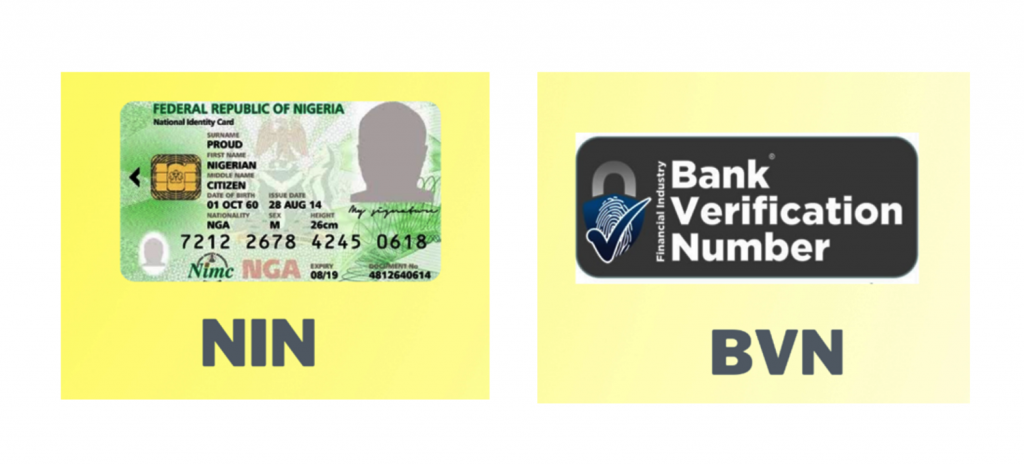Millions of bank accounts risk being blocked as the deadline for all accounts and wallets to have a Bank Verification Number (BVN) or National Identity Number (NIN) draws near.
On December 1, 2023, the Central Bank of Nigeria (CBN) issued a circular to all commercial, merchant, non-interest, payment service banks, other financial institutions, and mobile money operators, directing that the BVN or NIN attached to and/or associated with all accounts/wallets must be electronically revalidated by January 31, 2024.
The circular said that effective March 1, 2024, all funded accounts or wallets without BVN or NIN shall be placed on ‘Post No Debit or Credit’ and no further transactions would be permitted.
According to a 2023 report by Enhancing Financial Innovation and Access (EFInA), 52 percent (28 million) of unbanked adults have an NIN, and 5 percent (3 million) of banked adults are without a BVN or NIN.
The total number of bank accounts in the country as of 2021 was 191.4 million, out of which 133.5 were actively in use, according to data from the Nigeria Inter-Bank Settlement System (NIBSS).
The latest data from the NIBSS showed that the banking industry recorded a 59.96 million BVN count as of December 18, 2023.
The use of a combination of bank, non-bank, and informal mechanisms to manage financial needs has doubled to 20 percent in 2023 from 10 percent in 2020, according to EFInA.

A month after the circular was issued and published, BusinessDay visited some bank halls, spoke with some customers, and observed low compliance with the directive.
“There has been no rush by customers whose accounts have no BVN or NIN. I don’t think customers are informed. If they knew, there would have been a rush by now,” a bank branch manager who preferred to remain anonymous said.
A customer experience officer at Sterling Bank said the directive may not apply to many of their customers because most accounts had already been linked to a BVN.
“It is not a new injunction. Even before now, you can’t open an account without creating a BVN; the account will be blocked. If a customer opens an account online, they still need to come and create a BVN,” said the officer, who asked to be identified as Sophie.
A UBA bank officer said customers often visit bank branches located around markets to create BVNs for their existing accounts. “There has been an influx of customers, especially to market branches like Addo and Sangotedo, to link their accounts to a BVN.”
The CBN’s directive is part of its efforts to promote financial system stability by strengthening the Know Your Customer (KYC) procedures in financial institutions.
“We just need to update the customer’s profile on our systems and core banking applications with the new CBN directives. The customers are to come forward with the additional information,” Olanrewaju Kazeem, Group CEO of Alert Group, a pan-African Microfinance bank, said.
He said after the deadline, accounts without BVN or NIN would be restricted from withdrawals, transfers, and other debit transactions initiated by the account holders.
He said his bank is sensitising its customers through direct contact solicitation, calls, SMS, and emails.
“We also use occasions like customer forums to advocate for full compliance. The directive is already embedded in our account opening process, loan processing, and general account update,” he said. “We also have an implementation committee working on various fronts to enforce the directive, and the level of compliance is encouraging.”
Rasheed Bolarinwa, president of the Association of Corporate and Marketing Communications Professionals in Banks, said every bank customer in Nigeria operating tier 1, 2, 3, and wallet accounts is expected to visit his or her bank in person to link their bank account with BVN or NIN seamlessly as required by the regulator.
According to him, unless otherwise stated, those who fail to have their accounts linked before the stated deadline date will not be able to access and transact with their accounts.
He said, “Nigerians are advised not to wait until a week to the deadline to now start to swarm and overwhelm commercial banks. The time to do the linking is now. You walk into any bank branch nearest to you and get this done in less than 20 minutes.
“The deposit money banks in Nigeria have sent enough notices to the banking public – through direct messages to their customers through texts, emails, and also on social media—aside from several media reports when the directive was handed down to Nigerians.”
To ensure uniform and full compliance, the CBN has advised the executive compliance officers, chief compliance officers, or heads of the compliance functions to acquaint themselves with the guidance notes it provided, which it said apply to all institutions being regulated.
“Also, a comprehensive BVN and NIN audit shall be conducted shortly, and where breaches are identified, appropriate sanctions shall be applied. All financial institutions regulated by CBN are required to apply strict compliance on restrictions on Tier 1 accounts and wallets as they relate to limits on transaction values and cumulative balances,” it said.
According to the EFInA report, the use of financial services, including transaction accounts, savings, remittances, credit, and insurance, is on the rise. It said savings increased by 2 percent, remittances by 8 percent, and credit by 4 percent, indicating an increased deepening of inclusion.
The report said 38 percent of adults—69 percent of adults with a transactional account—saved formally, while 6 percent of adults—10.5 percent of adults with a transactional account—borrowed formally.
According to the report, 45 percent of Nigerians used digital financial services in the past 12 months, up from 34 percent in 2020. It stated that 83 percent of adults with a transactional account used digital financial services, up from 60 percent in 2020.
BusinessDay

